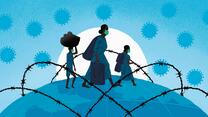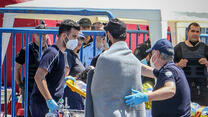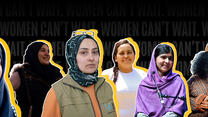Adel leads IRC Libya’s Response at Sea team, who are on call around the clock to deliver critical aid to those returned to Libya by the country’s Coast Guard. Upon disembarkation, the IRC team provides emergency healthcare to those in need before the majority are then sent to detention centres run by the Libyan authorities.
Adel is one of many International Rescue Committee (IRC) responders supporting vulnerable people in Niger, Libya and Italy, along what has become known as the Central Mediterranean Route (CMR). Stretching from Sub-Saharan Africa to Italy and Malta many of those making the journey transit through Libya on their way.
Each year, thousands of people make the treacherous journey. They are driven by multiple reasons including conflict and insecurity, increasing inequality, escalating climate change and a lack of economic opportunities.
Whatever first drove them to leave their home countries, they are all ultimately exposed to significant risks on the journey, including exploitation and abuse at the hands of both people smugglers and security services. Thousands tragically lose their lives in the Sahara Desert or the Mediterranean Sea every year.
In Libya, Adel and his colleagues at the IRC provide lifesaving assistance at disembarkation points and in detention centres. This includes providing critical medical services and basic assistance, such as the delivery of hygiene kits and other essential non-food items, to detainees who otherwise would have very minimal access to basic services.
Having assisted so many people that have been returned to Libya, Adel has a deep understanding of the harrowing journey they have just experienced:
“Only God knows how challenging the situations of these migrants and refugees are. They are people who attempt to escape from death, escape from oppression. They want to secure a decent life, want to learn, and want to work in order to secure a promising future.”
Adel explains what happens when he first gets a notification that there is a Response at Sea operation in progress:
“As the leader I directly inform the ‘Response at Sea’ team. They are notified as soon as possible for everyone to prepare themselves; the medical team, the ambulance, and nurses as well as the distribution team for food and non-food items. Then we try as much as possible to be prepared an hour before so that we are already at the port and standing by.
“We wait in the port until they arrive. Then we assist the people that need the most help first - the most vulnerable, such as pregnant women, sick women, children, and elderly people - and then the less vulnerable.
“Those trying to make it to Europe face such difficulties; drownings, food and water shortages, and running out of fuel are common during the journey. Sometimes they suffer trauma, for instance, falling off the boat, or a death amongst their group while at sea. So, when they are intercepted and returned to Libya, they are already drained. We help them as much as possible.”
One woman’s story has stuck with him.
“I will tell you why it is still vivid in my memory because we could not really help her. When the boat arrived the number of people onboard was huge and there were many dead bodies. Around eight or nine.
“There was a woman from the Ivory Coast. She did not know that her husband was among the dead. May he rest in peace.
“When she arrived, our health team were busy aiding people. Suddenly, she started looking for her husband. She rose from the crowd and started calling her husband's name loudly. But then she found out that her husband was among the dead.
“That was a tough situation; I remember this incident because we were not able to give her back her husband. But we managed to persuade the authorities not to move her into a detention centre. And this is why this story has stuck with me.”
- Adel, IRC Libya Response at Sea team lead
Adel has deep compassion for the people he serves and understands the unimaginable decisions they’ve had to make.
“They know they will face difficulties during the journey. They are scared that they might lose a family member who might fall off into the water and drown. They are scared they might run out of fuel and die. I think everybody should know about these things.”
Though Adel has seen and heard so many heart-breaking stories, he shows up each time grateful to do this work.
He dreams for a better future for his country:
“In the end, we hope that the country's condition will become better than the current situation so that we can develop and be able to help people and provide humanitarian assistance by all means. Thank you, I would like to say thank you to the IRC for giving me the opportunity to be a representative for work like this, thank you.”
The IRC in Libya
The International Rescue Committee (IRC) works with vulnerable migrants in Niger, Libya and Italy, providing humanitarian assistance to people in need. This includes all people on the move, including refugees, asylum seekers and economic migrants.
In Libya, our team’s provide emergency healthcare, cash support, information, and case management, particularly for vulnerable people, including children and survivors of gender-based violence (GBV).
Outside Libya, the IRC works to keep Libya high on the agenda of EU institutions, with a focus on moving democratic elections forward, ensuring parties to conflict continue to observe a nationwide ceasefire to avoid renewed violence, and safeguarding human rights and meeting humanitarian needs.



